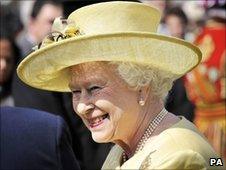Queen's visit would be Anglo-Irish milestone
- Published

No British monarch has visited the Irish Republic since it gained independence
In the spring of next year, the Queen may make one of the shortest but most significant journeys of her 57-year reign when she travels to Ireland.
Although the trip across the Irish Sea has not been finally agreed, plans for the historic first Dublin visit are gathering momentum.
The Queen has visited more than 100 countries, but not Ireland - even though it is the UK's closest neighbour.
In fact, no British monarch has visited the Republic of Ireland since it gained independence in the last century.
To those who know nothing about Anglo-Irish history it must seem odd that the globe-trotting British Queen has never made it across the sea to Dublin.
Ireland shares a land border with the UK, it shares the same language and thousands of people travel between the two countries every day.
Millions of Irish people support English football teams and many share the worldwide fascination with the lives of the British royal family. Yet the Queen has yet to set foot in Dublin.
A trip to Ireland has not been possible, for historical, political and security reasons. These are too numerous to mention and go back too far, but two incidents in the 1970s illustrate the depth of the more recent divisions.
Mountbatten
After the Bloody Sunday killings by the British Army in Londonderry in 1972, the British Embassy in Dublin was burnt down.
Seven years later, one of the Queen's relatives, Lord Louis Mountbatten, was killed by the IRA while holidaying on the Irish coast.
It is only since the turn of the century that the possibility of the Queen going to Dublin has been mentioned. The political climate has been changed by the bedding down of the Northern Ireland peace process.
Anglo-Irish relations have been transformed, mainly by Tony Blair and Bertie Ahern when they were British and Irish prime ministers. Not only were they key players in the Good Friday Agreement in 1998, they had a great personal rapport.

Irish President Mary McAleese has met the Queen on a number of occasions
Such was their friendship, few would have been surprised if they ended up going on holiday together. Given the long and deep historical difficulties between their respective countries, that was quite a feat.
However, if the Queen's visit does go ahead next year, perhaps the history books will show that the current British prime minister David Cameron also played a crucial role.
His speech to the House of Commons about the recent Bloody Sunday report, and his acceptance of British Army wrongdoing on that day, went down extremely well in Dublin. At the same time, he helped to dispel some of the historic Irish antagonism to Tory prime ministers.
However, the proposed landmark trip is not without its problems and sensitivities. Sinn Fein have already said they will be opposing it. Radical republican protest groups are likely to organise demonstrations.
The Irish government are also acutely aware that at a time when the country is battling an economic crisis, with people coping with pay cuts and job losses, any visit by the British Queen will have to be modest when it comes to pomp and ceremony.
Prince Charles has visited the Irish Republic, and the Irish president Mary McAleese has met the Queen on a number of occasions in London and Belfast. That has helped to prepare the ground for the Dublin get-together.
'Building bridges'
The best guess in terms of the timing is that it will be in April, May or June. President McAleese's term of office ends in November, and the months immediately before her departure are likely to be dominated by the election contest to decide her successor.
One of the themes of her presidency has been 'building bridges', and she has been involved in a number of ground-breaking community projects, along with her husband Martin.
The building of a metaphorical bridge between Dublin Castle and Buckingham Palace, by welcoming the Queen to Ireland, would be a milestone in Anglo-Irish relations.
It would signal a maturing of the relationship between the two countries, maybe even something approaching a normalisation.
Historians would have a field day.
After writing so much over the years about fighting, divisions and enemies, perhaps the next chapter in Anglo-Irish history will be entitled simply 'neighbours'.
- Published23 June 2010